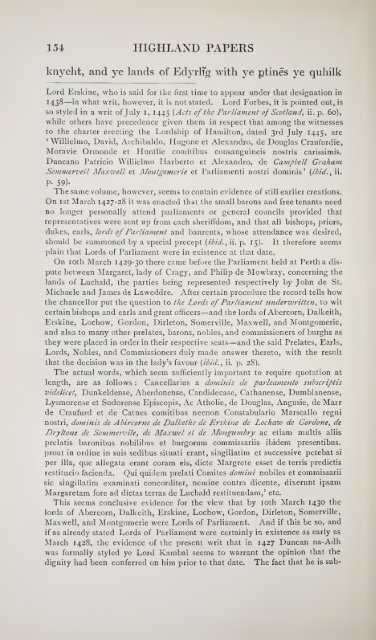You can download this volume here! - Electric Scotland
You can download this volume here! - Electric Scotland
You can download this volume here! - Electric Scotland
Create successful ePaper yourself
Turn your PDF publications into a flip-book with our unique Google optimized e-Paper software.
154 HIGHLAND PAPERS<br />
knycht, and ye lands of EdyrlTg with ye ptines ye quhilk<br />
Lord Erskine, who is said for the first time to appear under that designation in<br />
1438—in what writ, however, it is not stated. Lord Forbes, it is pointed out, is<br />
so styled in a writ of July 1, 1445 (Acts of the Parliament of <strong>Scotland</strong>, ii. p. 60),<br />
while others have precedence given them in respect that among the witnesses<br />
to the charter erecting the Lordship of Hamilton, dated 3rd July 1445, are<br />
' Willielmo, David, Archibaldo, Hugone et Alexandro, de Douglas Craufurdie,<br />
Moravie Ormonde et Huntlie comitibus consanguineis nostris carissimis.<br />
Dun<strong>can</strong>o Patricio Willielmo Harberto et Alexandro, de Campbell Graham<br />
Sommerveil Maxwell et Montgomerie et Parliamenti nostri dominis' (ibid., ii.<br />
P- 59)-<br />
The same <strong>volume</strong>, however, seems to contain evidence of still earlier creations.<br />
On 1st March 1427-28 it was enacted that the small barons and free tenants need<br />
no longer personally attend parliaments or general councils provided that<br />
representatives were sent up from each sheriffdom, and that all bishops, priors,<br />
dukes, earls, lords of Parliament and banrents, whose attendance was desired,<br />
should be summoned by a special precept (ibid., ii. p. 15). It t<strong>here</strong>fore seems<br />
plain that Lords of Parliament were in existence at that date.<br />
On 10th March 1429-30 t<strong>here</strong> came before the Parliament held at Perth a dis-<br />
pute between Margaret, lady of Cragy, and Philip de Mowbray, concerning the<br />
lands of Luchald, the parties being represented respectively by John de St.<br />
Michaele and James de Laweddre. After certain procedure the record tells how<br />
the chancellor put the question to the Lords of Parliament underwritten, to wit<br />
certain bishops and earls and great officers—and the lords of Abercorn, Dalkeith,<br />
Erskine, Lochow, Gordon, Dirleton, Somei ville, Maxwell, and Montgomerie,<br />
and also to many other prelates, barons, nobles, and commissioners of burghs as<br />
they were placed in order in their respective seats—and the said Prelates, Earls,<br />
Lords, Nobles, and Commissioners duly made answer t<strong>here</strong>to, with the result<br />
that the decision was in the lady's favour (ibid., ii. p. 28).<br />
The actual words, which seem sufficiently important to require quotation at<br />
length, are as follows : Cancellarius a dominis de parleamento subscriptis<br />
videlicet, Dunkeldense, Aberdonense, Candidecase, Cathanense, Dumblanense,<br />
Lysmorense et Sodorense Episcopis, Ac Atholie, de Douglas, Angusie, de Marr<br />
de Craufurd et de Catnes comitibus necnon Constabulario Marscallo regni<br />
nostri, dominis de Abircorne de Dalkethe de Erskine de Lochazv de Gordone, de<br />
Dryltone de Sommerz'ile, de Maxwel et de Mongumbry ac etiam multis aliis<br />
prelatis baronibus nobilibus et burgorum commissariis ibidem presentibus.<br />
prout in ordine in suis sedibus siluati erant, singillatim et successive petebat si<br />
per ilia, que allegata erant coram eis, dicte Margrete esset de terris predictis<br />
restitucio facienda. Qui quidem prelati Comites domini nobiles et commissarii<br />
sic singillatim examinati concorditer, nemine contra dicente, dixerunt ipsam<br />
Margaretam fore ad dictas terras de Luchald restituendam,' etc.<br />
This seems conclusive evidence for the view that by loth March 1430 the<br />
lords of Abercorn, Dalkeith, Erskine, Lochow, Gordon, Dirleton, Somerville,<br />
Maxwell, and Montgomerie were Lords of Parliament. And if <strong>this</strong> be so, and<br />
if as already stated Lords of Parliament were certainly in existence as early as<br />
March 1428, the evidence of the present writ that in 1427 Dun<strong>can</strong> na-Adh<br />
was formally styled ye Lord Kambal seems to warrant the opinion that the<br />
dignity had been conferred on him prior to that date. The fact that he is sub-

















